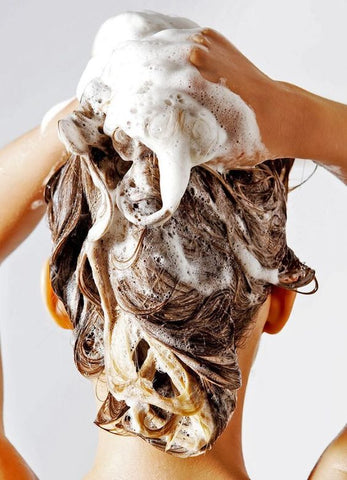Hair damage happens to all hair types, whether you have curly hair, straight hair, or somewhere in between. The good news is that understanding why your hair might be brittle or lackluster can help you avoid further damage. Heat styling, chemical treatments, and even environmental factors all play a role in damaging hair. Whether it's heat damage from your favorite straightener or chemical damage from dyeing, the hair cuticle suffers. Over time, this leads to problems like split ends, frizzy hair, and a weakened hair shaft.
Top 5 Causes of Hair Damage
Here are the most common causes of damaged hair that you might experience in your everyday life:
- Excessive Heat Styling: Regular use of heated tools like hair dryers and straighteners weakens the protective barrier of the hair shaft.
- Chemical Treatments: Hair coloring, bleaching, or chemically treating your hair (especially curly hair) can leave the hair cuticle damaged and dry.
- Environmental Factors: Sun exposure, pollution, and even chlorine from pools can cause dryness and damage to the hair fibers.
- Rough Handling: Brushing wet hair aggressively or using harsh hair elastics can lead to breakage and stress on hair.
- Product Buildup: Using too many products, like those containing mineral oil, sodium chloride, or sodium hydroxide, without properly cleansing can clog follicles and make hair brittle.
How Hair Repair Shampoo Can Help Repair Damaged Hair
Hair repair shampoos are formulated to strengthen hair, improve elasticity, and restore the health of damaged hair. These shampoos often contain key ingredients like amino acids, hyaluronic acid, and citric acid that help nourish and protect the hair cuticle. A repair shampoo works by gently cleansing and nourishing the hair shaft, leaving hair visibly healthier with more hydration. Whether you're dealing with frizz, split ends, or dry hair, a good hair repair shampoo can help bring your hair back to life.
Ingredients to Look for in Hair Repair Shampoo
When choosing a hair repair shampoo, there are several ingredients you’ll want to look for to make sure it’s effectively repairing hair:
- Keratin: Helps to repair hair by rebuilding the damaged hair fibers, especially after chemical treatments.
- Argan Oil: A rich source of seed oil that nourishes and moisturizes dry hair.
- Glycerin: Acts as a humectant, drawing moisture into the hair to improve its texture and reduce frizz.
- Hyaluronic Acid: Known for its ability to lock in moisture and hydrate both hair and scalp.
- Ceramides: Strengthen the protective barrier of the hair shaft and help prevent breakage.
How to Protect Your Hair and Prevent Future Damage
Using a quality hair repair shampoo is just one part of maintaining a healthy hair care routine. Here are some tips for preventing future damage:
- Reduce the use of heated styling tools like straighteners and curling irons.
- Be gentle with wet hair—use a wide-tooth comb to detangle and avoid rubbing it harshly with a towel.
- Opt for products that are free from harsh chemicals like sodium lauryl sulfoacetate, sodium benzoate, and benzyl alcohol.
- Incorporate deep-conditioning treatments with ingredients like coco glucoside and glycol distearate into your hair care routine to improve elasticity and reduce frizz.
- Make sure to protect your hair from environmental stresses by using products that shield against UV rays and pollution.
Why Hair Repair Shampoos Are Ideal for Chemically Treated and Curly Hair
If you have chemically treated hair or naturally curly hair, you’re likely familiar with the challenges of maintaining healthy locks. Chemically treated hair often feels weak and dry, while curly hair can struggle with frizz and lack of definition. Hair repair shampoos specifically tested for these hair types can provide more hydration and help reduce frizz. Ingredients like caprylyl glycol and hydrogenated vegetable glycerides citrate can give curly and chemically treated hair the extra moisture it needs while helping to repair hair from within.
Choosing the Right Hair Care Products for Your Routine
When putting together a hair care routine, it's important to choose products that work with your specific hair type and concerns. For instance, a restoring shampoo designed to repair and protect damaged hair can make a big difference in your daily routine. Look for shampoo and conditioner sets that help with both cleansing and hydration. Avoid formulas with harsh chemicals like sodium cocoyl isethionate, sodium methyl cocoyl taurate, and sodium lauroyl sarcosinate, which can strip the hair of its natural oils. Instead, opt for cruelty-free shampoos and conditioners with nourishing ingredients like benzyl salicylate, potassium sorbate, and sorbic acid.
How to Use Hair Repair Shampoo in Your Routine
Using a hair repair shampoo is straightforward, but a few extra steps can enhance the results. Start by massaging the shampoo into your scalp to stimulate blood flow and promote healthy hair growth. Be sure to rinse thoroughly, as any product left behind can lead to buildup. Follow up with a conditioner that complements your shampoo. For best results, try air-drying your hair, especially if you have damp hair that is prone to damage from heat styling. Consistent use of hair repair shampoos and conditioners can lead to visibly healthier hair over time. If you're ready to start using a product that really repairs hair, or if you're a store owner looking to offer quality hair care solutions to your customers, explore a range of hair care products like shampoo add-ons, conditioners, and deep treatments. With ingredients like coco glucoside, sodium lauroyl sarcosinate, and sodium chloride, these products help restore your hair's natural shine and improve its texture. A well-thought-out hair care routine doesn't just reduce frizz and add shine—it keeps your hair healthy, strong, and resistant to external stresses. Make sure to select products that nourish, repair, and maintain the balance your hair needs!
